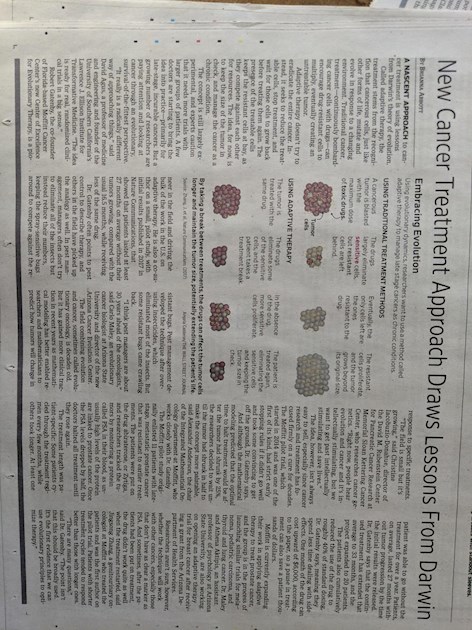Please reply in regards to the recent WSJ article on adaptive therapy for treating prostrate cancer.
WSJ article : Please reply in regards... - Advanced Prostate...
WSJ article

Can you provide a link to an article or summary that isn't behind a paywall? I think you would get a significant increase in the amount of feedback received.
Has anyone waded thru this lengthy report and determined any conclusions?
I’m referring to the second, “Nature”, article.
It brought to mind what I have been doing. I think maybe 14 years ago, I came across a hypothesis that testosterone [T] could be used to reset the profile of PCa cells after ADT. Most men were failing ADT in 18-24 months back then. IADT with T restoration in the off phase might be used indefinitely.
Perhaps I didn't buy into "indefinitely" in every case, but I did feel that in men who had not been heavily treated, there might be a very significant increase in survival.
When the time came, I decided on 3 months of castration alternating with 3 months of high-normal T. This worked well for a number of years.
Dr. Sam Denmeade's BAT approach is similar, except that the cycling is more rapid - 28 days versus 6 months, and supraphysiological T is used (supposedly to induce double-strand DNA breaks), but the basic idea is the same - disease management via reversal of treatment adaptation.
-Patrick
I've been following this work by the group at Moffitt for some time now, and applying it to my own treatment. It's painfully obvious that giving maximum tolerated dose until the medication fails doesn't work very well. Lupron fails on average after 24 months, Zytiga even faster.
So instead of pursuing the vain hope of a cure, manage the cancer as a chronic disease. I knock the PSA (and presumably the cancer) down for 30-90 days, then let T recover. I stay off the meds until the PSA rises back to it's pretreatment levels.
The idea is that once PSA has reached nadir, the remaining cancer cells are the dangerous ones - they don't respond to the drug. But that response comes at a metabolic cost, and in the pre-treatment tumor those resistant cells are out-competed by the cells that ARE susceptible to the drug.
So don't spend too much time at nadir PSA, as it lets the truly dangerous cells grow much faster with all their competition gone. Life as a eunuch sucks anyway. This approach has given me vastly improved quality of life and a reasonable hope for increased longevity. That's a good bet in my book.
Recent studies show that 2.0 is a good target to restart ADT, assuming ones nadir is well below that.
Reference, please.
ncbi.nlm.nih.gov/pubmed/315...
Thank you. I want to read that carefully.
Interesting. Thanks for posting. My husband has had great results on scans- mets shrinking, nothing new, etc.... but his PSA has never gone below 7.9 in the 2.5 years of treatment (chemo plus lupron to start then Zytiga Prednisone and lupron since chemo ended). His PSA started over 677 with mets to bones and local lymphs, gleason 9 and he was 49 years old. I'm wondering if it is good that his PSA hasn't gotten to nadir. I guess we can only speculate but he feels good and scans are good.